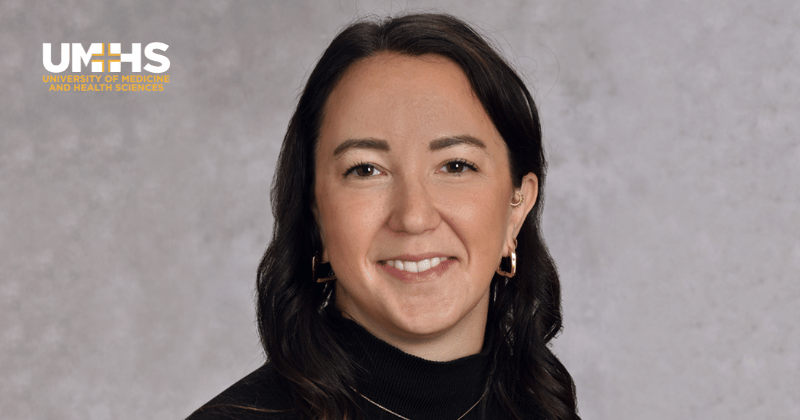UMHS Class of 2013 graduate Dr. Andrea Cuviello will speak at the White Coat Ceremony on Saturday, January 20, 2024 at UMHS in St. Kitts. Dr. Cuviello is a noted Pediatric Palliative Oncologist and assistant professor at Phoenix Children’s in Arizona. She was previously an assistant professor and instructor at the renowned St. Jude Children’s Research Hospital.
Dr. Cuviello spoke to the UMHS Endeavour recently about her career as a Pediatric Palliative Oncologist and discussed how she helps treat children with cancer while also providing emotional support to families. She discussed what palliative care is, how she is contributing to the research aspect of this area of medicine, new treatments and medical breakthroughs that are saving more lives, as well as her medical education at UMHS and more.
Work at Phoenix Children's
UMHS Endeavour: Dr. Cuviello, could you just tell us briefly about where you are currently working and what someone in your specialty does to help patients?
Dr. Andrea Cuviello: I'm currently an assistant clinical professor and staff physician at Phoenix Children's. I am primarily part of the palliative care division and I work very closely with our pediatric oncology team to help support patients and families with cancer. I'm also developing a research side to our division, which is part of the new vision for Phoenix Children's as an institution. As far as what palliative care is, I give it a blanket description of being an extra layer of support and an advocate for our patients and families.
Most commonly, I would say people hear palliative care and they think of it being end of life or hospice-related, which is true. And I kind of describe that as sort of a branch on the tree of all of the things that I do. More often I'm actually helping with symptom management. I do a lot of work around communication and that's really just helping to make sure our patients and families are getting the information that they need in a way that they prefer. And then the last bit that I do is really focused around goals of care. And when I say that, I really just mean getting to know patients and families and helping them keep what's most important for them and their child at the forefront of all of their medical decisions.
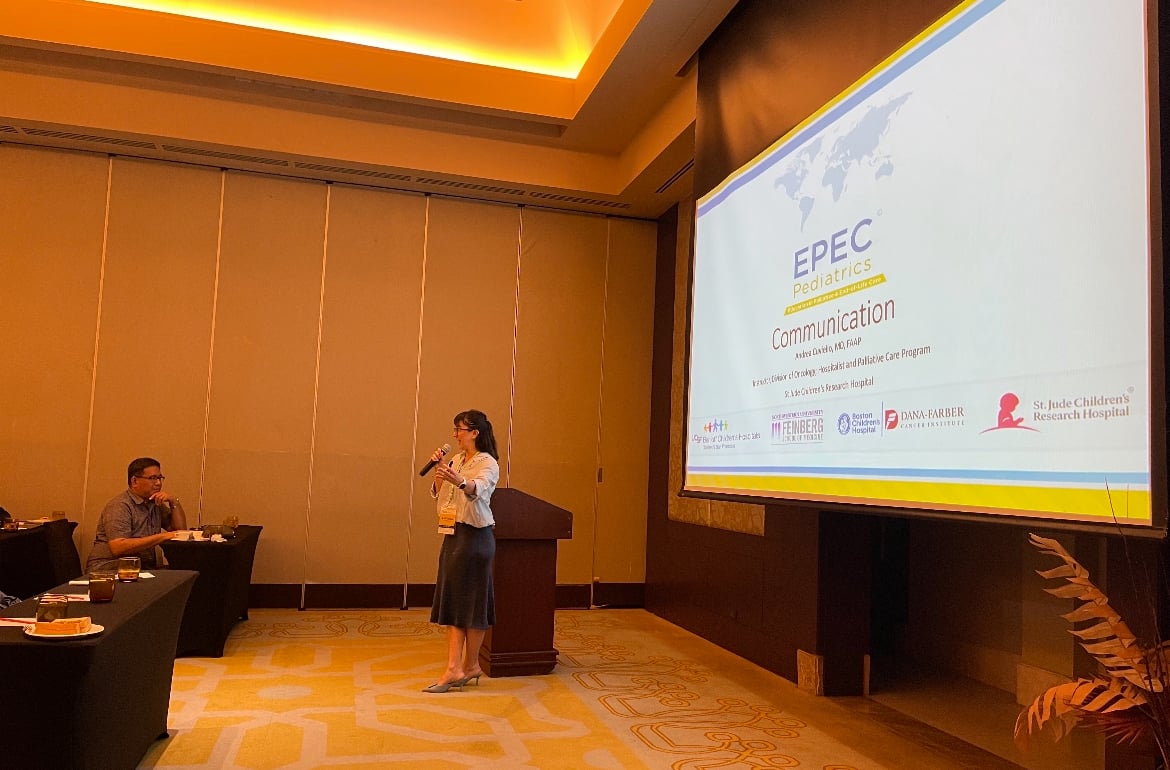
Dr. Andrea Cuviello teaching at St. Jude's Global Academy in Memphis, TN in the fall of 2023. Photo courtesy of Dr. Andrea Cuviello.
Keynote at UMHS White Coat Ceremony in St. Kitts
You are about to speak at the upcoming UMHS White Coat Ceremony in January 2024. Do you have any message that you wish to share with the incoming class?
I'm so excited to have been offered this prestigious opportunity to speak for the incoming class. I don't want to give away too much right now and honestly, I'm still kind of crafting exactly what I want to say, but overall, I'm hoping to leave a message that is just both inspiring and encouraging. This incoming class, their journeys as physicians are just beginning and it can be a long and arduous road. So I've found what has served me best is really just following your intuition and the success in your ‘dream career’ will kind of follow that. And no one achieves anything alone. So lean on friends, find mentors, and more importantly sponsors who want to help you succeed.
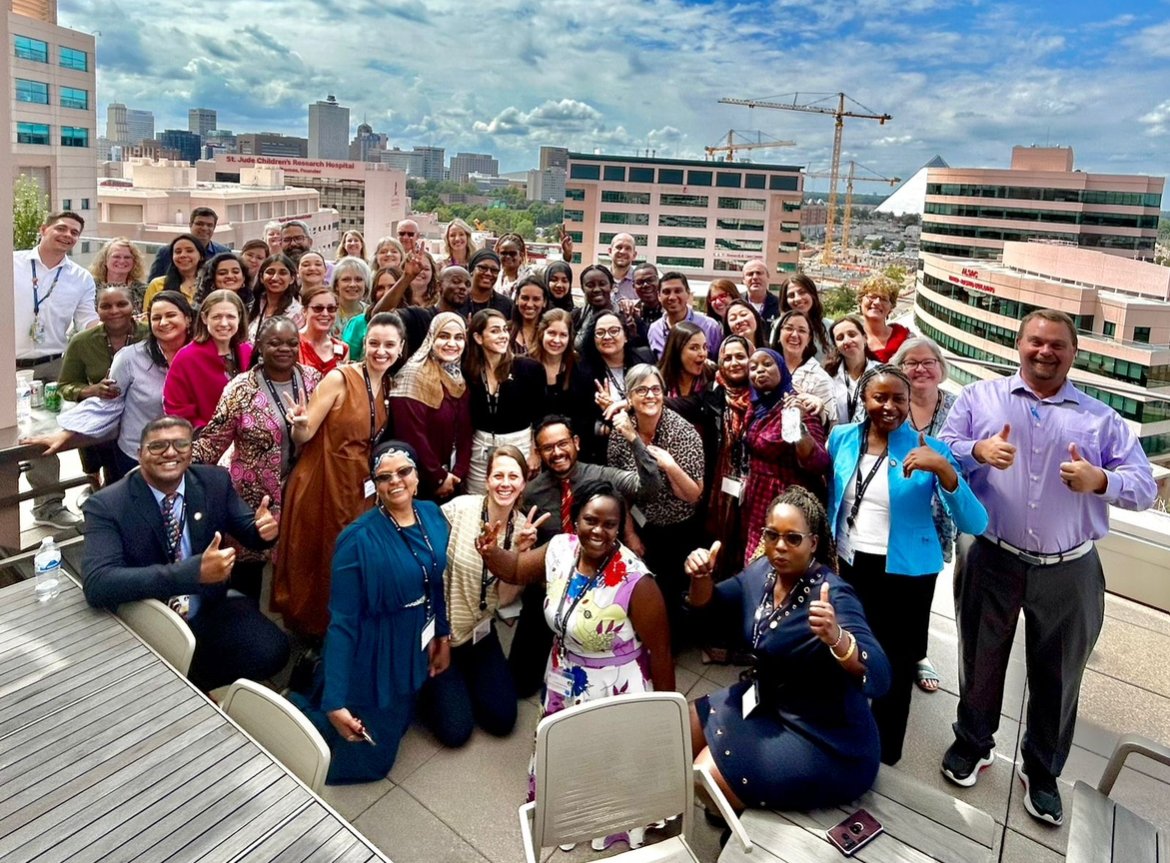
Dr. Andrea Cuviello with colleagues at the St. Jude's Global Academy in Memphis, TN last year. Photo courtesy of Dr. Cuviello.
Dr. Cuviello, you also worked at the famous St. Jude Children's Research Hospital. Can you tell us briefly about what that experience was like?
St. Jude is truly a unique place with incredible opportunity. I was lucky enough to have my palliative care fellowship in part be sponsored by St. Jude and was really drawn to the institution based on my interests in global health. During my time there in my first attending position, I found great support in weaving together my love of pediatric oncology and palliative care and establishing an academic foundation. My time there led to several additional training opportunities and scholarships that have not only served me clinically, but have also allowed me to grow as an expert in my field. Probably perhaps the coolest part of my St. Jude experience were the opportunities to teach palliative medicine to international clinicians. I can now say that I have several colleagues and friends around the globe who are dedicated to the cause of improving palliative care access to pediatric patients and families. And I still continue to partner with my colleagues at St. Jude today, dabbling in some research endeavors and continuing to teach on both a national and international stage.
What advice do you have for current and prospective students that are thinking about maybe going into pediatric palliative oncology?
That’s a great question. I would say first and foremost, take care of yourself. It's a difficult career path emotionally, physically and mentally. And often it can be hard to really protect work-life balance. So I think the onus becomes on you as an individual to find people who will or who can teach you how to assert good boundaries. I think apart from the self-care and sort of healthy work-life boundaries, finding people in your field who will act as mentors and more importantly as sponsors. It's so important to have people who will give you credit for your work when you're not even in the room to hear it or who will think about you when they hear about a new opportunity and think, "Oh, wow—this might really help this person's career grow and develop." So, sponsors, I would say are kind of hard to find, but they can become incredible colleagues and friends in your professional life.
Let's switch gears a little bit and can you tell me a little bit about why you chose UMHS over other med schools?
I think honestly at the time for me it was the tuition that was kind of an appealing factor. I figured anyone can learn the book science part of medicine really from anywhere. And when it came down to the clinical education aspect of this medical training, I felt like UMHS really had a good infrastructure in place to allow me to receive on-par training with US medical students and even on some level promote unique opportunities like working in different hospital systems and networking across the country, which you don't really get or see too often in the US medical system.
That’s true. Is there anything else, Dr. Cuviello, that you would like to add about either pediatric palliative oncology or UMHS that you think that current and prospective students should know?
I would say that choosing a career in medicine is entirely a giant leap of faith. So lean in, it will feel uncomfortable, you'll feel lost at times, but trust the process, remember your why, and you will come through the other side in exactly the right place you're supposed to be.
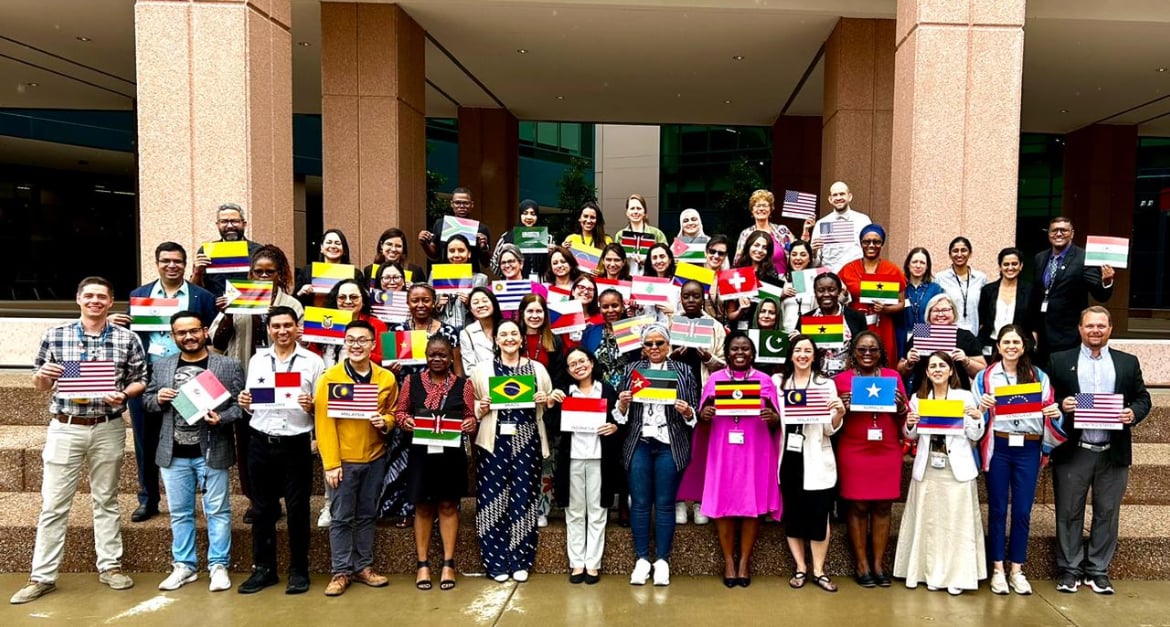
Dr. Andrea Cuviello with colleagues at a conference in Manila, Philippines. Photo courtesy of Dr. Cuviello.
Growing up in Canada
Dr. Cuviello, could you tell us where you're from and if you always wanted to be a doctor?
I was born and raised in Niagara Falls, Ontario, Canada, and I guess you could say that I always wanted to be a doctor. There is this picture of me as a child, I'm maybe three or four years old in it and I'm playing doctor on my grandfather who's very patiently lying on the ground. I always knew that I liked medicine from a scientific aspect and then really just enjoyed being able to bond and interact with people. And probably if I'm being really truthful, mostly kids, which explains why I ended up a pediatrician.
That's important, I think, since you're in pediatric oncology. Now I see that you went to McMaster University. What was your major as an undergrad?
Biology.
Is there anything specific about your medical education at St. Kitts that you think helped you become the doctor you are today?
I think probably during my third and fourth years I chose to move around frequently and tried to rotate through what were thought to be the best or the stronger rotations for each core rotation. This was sometimes stressful because you had to move around pretty quickly. But I think it really gave me some nice insight into different hospital systems, community hospitals versus academic hospitals, big hospitals versus small hospitals, etc. It really allowed me to grow quite a robust and diverse network. Actually, I think some of my first academic opportunities were offered to me by surgical residents, even though what I do today is nowhere near anything along those lines. And in looking back, obtaining my pediatric residency at a community hospital, I think truly shaped me into a well-rounded physician from the start. It's something that I may not have had if I didn't take that approach to my third and fourth-year rotations.
One thing I wanted to touch on is I've had many alumni tell me that they wanted to go into pediatric oncology, but it's such a tough specialty for many because one has to deal with so many very sick children. Because you do help a lot of children, but also unfortunately there's children that don't make it. How do you cope with this? What is the way that you cope with this, dealing with this part of your job?
I think that's a really great and important question. And one I would argue that actually extends into all specialties of medicine. I think in pediatric oncology, the highs are really high, which is nice. And like you had mentioned, the lows can be really low. I think prioritizing self-care is honestly the only way to survive and that looks different for everyone. I also think that self-care really does evolve over time and it's never fully this thing that you have totally figured out. It's always changing. For me, a good routine is key and I find that exercise is really kind of a staple to that routine. I'm also a big foodie, so carving out time to go and explore new places is something I like to do. And then of course I love to travel whenever I can, but self-care doesn't have to be that big or grandiose. It can be something as simple as reading a book or taking your dog to the park or even just binge-watching your favorite trash TV show. All that kind of stuff I think counts. And what's really important is that you just do something.
What are some of the new breakthroughs in research procedures in medicine and pediatric oncology that you think are helping young patients beat cancer or survive much longer? And I should preface with, I understand that palliative care doesn't mean hospice, so it's really just treating, is that correct? It's really treating critically ill patients, but making them get through the pain of dealing with some form of cancer. But what are some of the breakthroughs or treatments that are helping patients that you'd like to talk about?
I think in the pediatric oncology space, I would say probably the coolest thing to have happened over the last 10 years that I've gotten to be a part of the front lines of really is CAR T-cell therapy. This is where you take a patient's own T-cells, extract them, genetically modify them so that they recognize proteins that are on the surface of leukemia cells or cancer cells, and then you infuse them back into the patient and they go do their thing and eat up all the cancer. Primarily this has been used in leukemia with some really cool success in refractory or relapsed ALL. We're still trying to find the secret sauce and make it work for AML cases. And it's actually been really fascinating to see this same technology and concept extrapolated into the realm of neuro-oncology and solid tumor. Actually, during my time when I was a fellow at the NIH, I was a part of caring for children who were enrolling on some of these first in human, first in pediatrics phase one studies looking at CAR T-cell therapy. So that was both equally cool and really educational. And then I would say the last thing that I would totally be remiss if I did not mention is the recently FDA approved gene therapy CRISPR for sickle cell disease. I think it's going to be really fascinating to see how this impacts and really changes the trajectory of an often-overlooked life limiting disease.
For sickle cell disease, that new medication the FDA just approved really is a game changer. Do you have anything to say specifically for Canadians out there considering studying medicine abroad who might be hesitant to apply to UMHS or a Caribbean med school? Anything you'd say to fellow Canadians out there?
I would say research is key here. So, it's not impossible to get back to Canada by any means. I have plenty of friends and colleagues who have done it, some of whom actually attended UMHS. I think the earlier you can have a clear plan of how to get back across, probably the better. Personally, for me, I just went where the winds of opportunity were blowing. So, I actually looked into going back to Canada at several points along my journey and every time it just didn't seem right or I was more excited about the opportunities that were here in the United States. And then as a result, I would say that I've learned an abundant amount of information about the immigration system here in the United States. And then also a little bit about what it could look like to go back to Canada. So, I would be happy to be a resource and share that for anybody who's interested.
Finally, let’s talk briefly about our UMHS alumni. Is there anything that you would like to say to your fellow UMHS alumni out there, or Canadian alumni, do you have any ideas on how we could serve our alumni better?
I just think it would be incredible to see where everyone has ended up. Your time on the island, you essentially become each other's support system and as the years go by, everyone goes off in their different ways and it gets harder and harder to keep in touch. I'm fortunate that I have kept some of my friends from the island and I know they will be a part of my life forever, but I just think it would be great to have everybody come back together. I know we all would love a good excuse to go back to St. Kitts and do a big reunion.
Are you open to having prospective and current students contact you?
Yes, I'm absolutely happy to be a resource and help people navigate their way through this sometimes very confusing system. I would say probably email is the best way to reach me.
Reach Dr. Andrea Cuviello via email at acuviello@phoenixchildrens.com
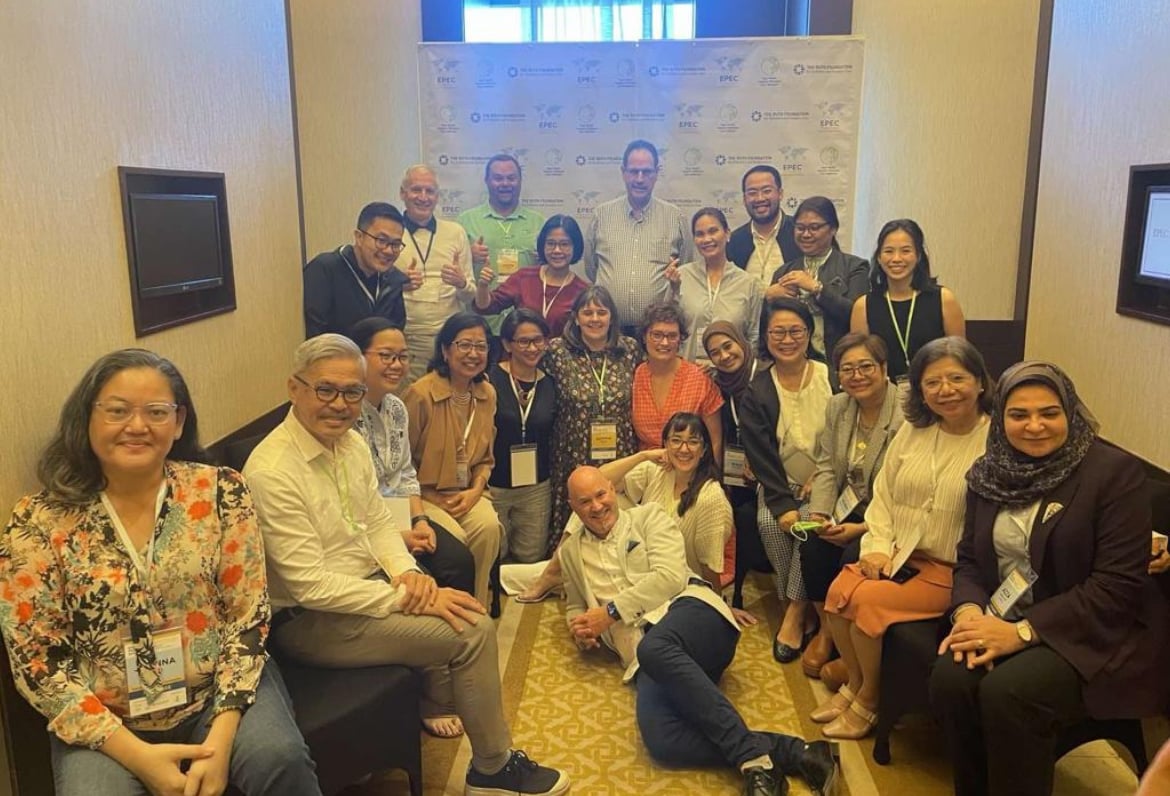
Dr. Andrea Cuviello with colleagues at a conference in Manila. Photo courtesy of Dr. Andrea Cuviello.
(Top photo): Dr. Andrea Cuviello. Photo courtesy of Dr. Cuviello.
UMHS YouTube interview with Dr. Andrea Cuviello

Scott is Director of Digital Content & Alumni Communications Liaison at UMHS and editor of the UMHS Endeavour blog. When he's not writing about UMHS students, faculty, events, public health, alumni and UMHS research, he writes and edits Broadway theater reviews for a website he publishes in New York City, StageZine.com.













